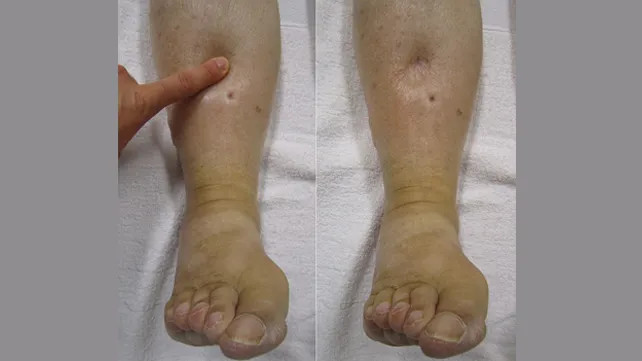Definisi
Edema anasarka adalah kondisi medis yang ditandai dengan pembengkakan pada seluruh tubuh. Hal ini terjadi ketika jaringan tubuh terisi terlalu banyak cairan akibat beberapa hal tertentu. Penumpukan cairan dapat terjadi akibat penyakit dan kondisi yang memengaruhi protein tubuh, memengaruhi keseimbangan cairan, atau yang menyebabkan abnormalitas pembuluh darah atau sistem getah bening.
Edema anasarka berbeda dengan tipe edema (bengkak) lainnya yang hanya melibatkan satu atau dua bagian tubuh. Pada situasi normal, ketika ada bagian tubuh yang membengkak, biasanya disebabkan oleh terlalu banyak konsumsi makanan asin, cedera, atau efek samping ringan dari obat. Bengkak yang seperti ini biasanya melibatkan kaki, tangan, atau tungkai. Pada anasarka, edema sangat berat sampai mengganggu pergerakan. Kondisi ini juga disebut dengan edema generalisata ekstrem atau edema masif. Ketika hal ini terjadi, biasanya disebabkan oleh kondisi medis yang berat atau kerusakan organ.
Oleh karena itu, perlu dipahami bahwa anasarka bukan merupakan sebuah penyakit, melainkan sebuah gejala atau akibat dari suatu kondisi medis.
Penyebab
Edema anasarka biasanya disebabkan oleh abnormalitas pada pembuluh darah, sumbatan pembuluh limfa, dan retensi air di seluruh tubuh. Kondisi ini terjadi akibat beberapa hal. Berikut ini adalah beberapa penyebab yang paling banyak ditemukan:
- Penyakit ginjal. Ketika ginjal Anda tidak lagi berfungsi seperti seharusnya, ginjal tidak dapat membuang cairan dari tubuh dengan cukup. Hal ini disebut dengan retensi cairan dan dapat menyebabkan edema anasarka.
- Sirosis hati. Sirosis terjadi ketika hati Anda gagal untuk berfungsi. Penyakit hati menyebabkan perubahan pada hormon yang memengaruhi regulasi cairan di dalam tubuh. gagal hati akan menyebabkan bocornya cairan ke jaringan.
Jika Anda ingin mengetahui selengkapnya mengenai sirosis hepatis, Anda dapat membacanya di sini: Sirosis Hepatis - Definisi, Penyebab, Gejala, dan Pengobatannya
- Malnutrisi berat. Kekurangan (defisiensi) protein pada diet Anda dapat menyebabkan penumpukan cairan di jaringan. Ketika defisiensi ini ekstrem, dapat terjadi edema anasarka.
- Reaksi alergi. Seluruh tubuh Anda dapat menyimpan cairan karena reaksi alergi. Ketika reaksi berat, edema anasarka dapat terjadi.
- Sindrom kapiler bocor. Ini adalah penyebab edema anasarka yang lebih jarang. Hal ini terjadi ketika protein dan cairan bocor keluar dari pembuluh darah masuk ke jaringan tubuh. Penelitian yang mempelajari alasan terjadinya hal ini masih kurang, namun para ahli mempercayai hal ini disebabkan oleh peradangan dan cedera pada pembuluh darah. Hal ini juga dikatakan dapat disebabkan oleh beberapa obat dan toksin. Suatu studi kasus menunjukan bahwa sindrom kapiler bocor juga dapat terjadi akibat obat kanker tertentu seperti gemsitabin. Pada studi lainnya, anasarka terjadi akibat gigitan ular.
- Pemberian cairan infus yang berlebihan. Rumah sakit sering memberikan cairan infus untuk menangani berbagai macam kondisi, seperti infeksi, dehidrasi, dan syok. Jika tubuh Anda tidak mampu beradaptasi dengan cairan ini, Anda dapat mengalami edema berat.
- Efek samping obat. Berbagai obat-obatan, termasuk obat kanker spesifik (misalnya dosetaksel), dapat menyebabkan edema anasarka. Obat lainnya yang dapat menyebabkan kondisi ini meliputi obat penurun tekanan darah seperti amlodipine. Obat steroid juga dapat menyebabkan kondisi ini. pemberhentian obat tersebut seringnya akan meredakan gejala edema anasarka.
- Hemoglobin Bart pada talasemia alfa. Suatu kondisi genetik dimana seseorang terlahir memproduksi hemoglobin (protein darah yang mengandung besi) dengan struktur yang abnormal yang mengikat oksigen terlalu kencang, sehingga oksigen tidak dapat disalurkan dengan baik ke jaringan di seluruh tubuh.
Baca Juga: Amlodipine - Cara Kerja, Kontraindikasi dan Efek Samping
Faktor Risiko
Beberapa hal yang dapat meningkatkan risiko edema secara umum, antara lain:
- Kehamilan
- Konsumsi obat-obatan tertentu
- Menderita penyakit kronis (jangka panjang), seperti gagal jantung, penyakit hati, atau penyakit ginjal yang tidak terkontrol dengan baik
- Menjalani operasi yang melibatkan kelenjar getah bening
Gejala
Kebanyakan kasus edema hanya melibatkan satu atau dua area tubuh (sebagai contoh, salah satu atau kedua tungkai bawah). Anasarka melibatkan keseluruhan tubuh dan lebih ekstrem dari edema biasa. Pada anasarka, terjadi pembengkakan di seluruh tubuh, mulai dari kepala sampai jari kaki. Anda juga dapat mengalami:
- Lesung atau cekungan pada kulit setelah Anda menekan kulit dengan jari selama beberapa detik
- Tekanan darah tinggi atau rendah
- Denyut jantung lambat atau cepat
- Kegagalan sistem organ, terutama ginjal dan hati
Pada kasus anasarka yang ekstrem, Anda akan mengalami rasa tidak nyaman yang berat. Anda juga dapat mengalami kesulitan bergerak, tidak dapat menggerakan anggota gerak atau berjalan. Pembengkakan pada wajah Anda juga dapat mengganggu penglihatan karena akan membuat Anda kesulitan untuk membuka mata.
Diagnosis
Edema anasarka dapat didiagnosis melalui anamnesis atau wawancara medis, pemeriksaan fisik dan pemeriksaan penunjang.
Wawancara Medis
Wawancara antara dokter dan pasien. Dokter akan bertanya mengenai:
- Gejala yang dirasakan saat ini
- Riwayat penyakit dahulu
- Riwayat penyakit keluarga
Pemeriksaan Fisik
Pada pemeriksaan fisik, dokter akan memeriksa tekanan darah, laju pernapasan, denyut nadi, dan suhu tubuh. Selanjutnya, dokter akan memeriksa bagian tubuh yang mengalami edema. Dokter akan menekan bagian tersebut dan menilai cekungan yang terbentuk akibat penekanan.
Pemeriksaan Penunjang
Dokter juga dapat menyarankan beberapa pemeriksaan lainnya untuk menentukan kondisi yang mendasari terjadinya edema anasarka, meliputi:
- Pemeriksaan darah serial untuk memeriksa fungsi hati, jantung, dan ginjal, serta kadar hemoglobin
- CT scan untuk memeriksa rongga dada
- USG jantung atau ekokardiografi untuk melihat adanya abnormalitas pada struktur dan fungsi jantung
- Stress test unutk memantau fungsi jantung
- Tes alergi
Tata Laksana
Untuk memberikan terapi yang tepat, dokter harus mengidentifikasi kondisi yang menyebabkan anasarka dan menanganinya. Selain itu, dokter biasanya akan meresepkan obat untuk menangani pembengkakan:
- Diuretik. Dokter seringnya meresepkan obat yang disebut diuretik. Obat ini bekerja dengan cara membantu ginjal mengeluarkan lebih banyak garam ke urin, yang menyebabkan keluarnya lebih banyak cairan melalui urin.
- Albumin. Albumin adalah protein yang diproduksi oleh tubuh yang penting untuk berbagai fungsi tubuh, termasuk keseimbangan cairan. Pada kasus malnutrisi atau kondisi medis tertentu yang serius, kadar albumin dapat terlalu rendah. Ketika hal ini terjadi, cairan di pembuluh darah akan keluar ke jaringan menyebabkan bengkak. Pada beberapa kasus, menggantikan albumin dapat membantu menangani masalah ini.
Baca Juga: Albumin - Cara Kerja, Kontraindikasi dan Efek Samping
Selain obat-obatan, terdapat tips yang dapat dilakukan di rumah untuk membantu menangani edema anasarka, yaitu:
- Batasi asupan garam untuk mengurangi pembengkakan terkait anasarka
- Pijat tubuh dengan lembut mengikuti arah jantung
- Olahraga untuk memompa kelebihan cairan kembali ke jantung. Anda harus berkonsultasi ke dokter terlebih dahulu jika Anda memiliki masalah jantung
- Meningkatkan asupan protein dan serat
Komplikasi
Edema anasarka dapat menyebabkan:
- Edema paru, yaitu penumpukan cairan di dalam paru-paru. Kondisi ini mengancam nyawa
- Kesulitan berjalan
- Kekakuan tubuh
- Kulit yang meregang sehingga terasa gatal
- Peningkatan risiko infeksi, terutama pada area lipatan
- Terbentuknya jaringan skar di antara lapisan kulit
- Penurunan aliran darah
- Peningkatan risiko luka (ulkus) pada kulit
Baca selengkapnya mengenai edema paru, di sini: Edema Paru - Definisi, Penyebab, Gejala, dan Pengobatannya
Pencegahan
Edema anasarka kebanyakan disebabkan oleh penyakit kronis. Oleh karena itu, jika Anda menderita salah satu penyakit kronis, sebaiknya Anda meminum obat yang diresepkan dokter dengan teratur dan mengikuti jadwal kontrol sesuai anjuran dokter untuk menghindari komplikasi penyakit seperti edema anasarka.
Kapan Harus ke Dokter?
Jika Anda mengalami gejala edema anasarka, segera berkonsultasi dengan dokter.
Kasus edema anasarka yang berat dapat merupakan suatu kegawatan. Jika selain gejala di atas Anda juga mengalami nyeri dada, sesak nafas, sulit bernafas, segera cari pertolongan medis. Hal ini dapat menjadi tanda edema paru.
Mau tahu informasi seputar penyakit lainnya? Cek di sini, ya!
- dr. Monica Salim
What is anasarca: Causes, symptoms, and treatment (2021) WebMD. WebMD. Available at: https://www.webmd.com/heart-disease/what-is-anasarca (Accessed: February 9, 2023).
Anasarca: Causes, treatment, and definition (2018) Medical News Today. MediLexicon International. Available at: https://www.medicalnewstoday.com/articles/320906#treatment (Accessed: February 10, 2023).
Essentials of glycobiology - NCBI bookshelf (2022). Available at: https://www.ncbi.nlm.nih.gov/books/NBK579918/ (Accessed: February 10, 2023).









